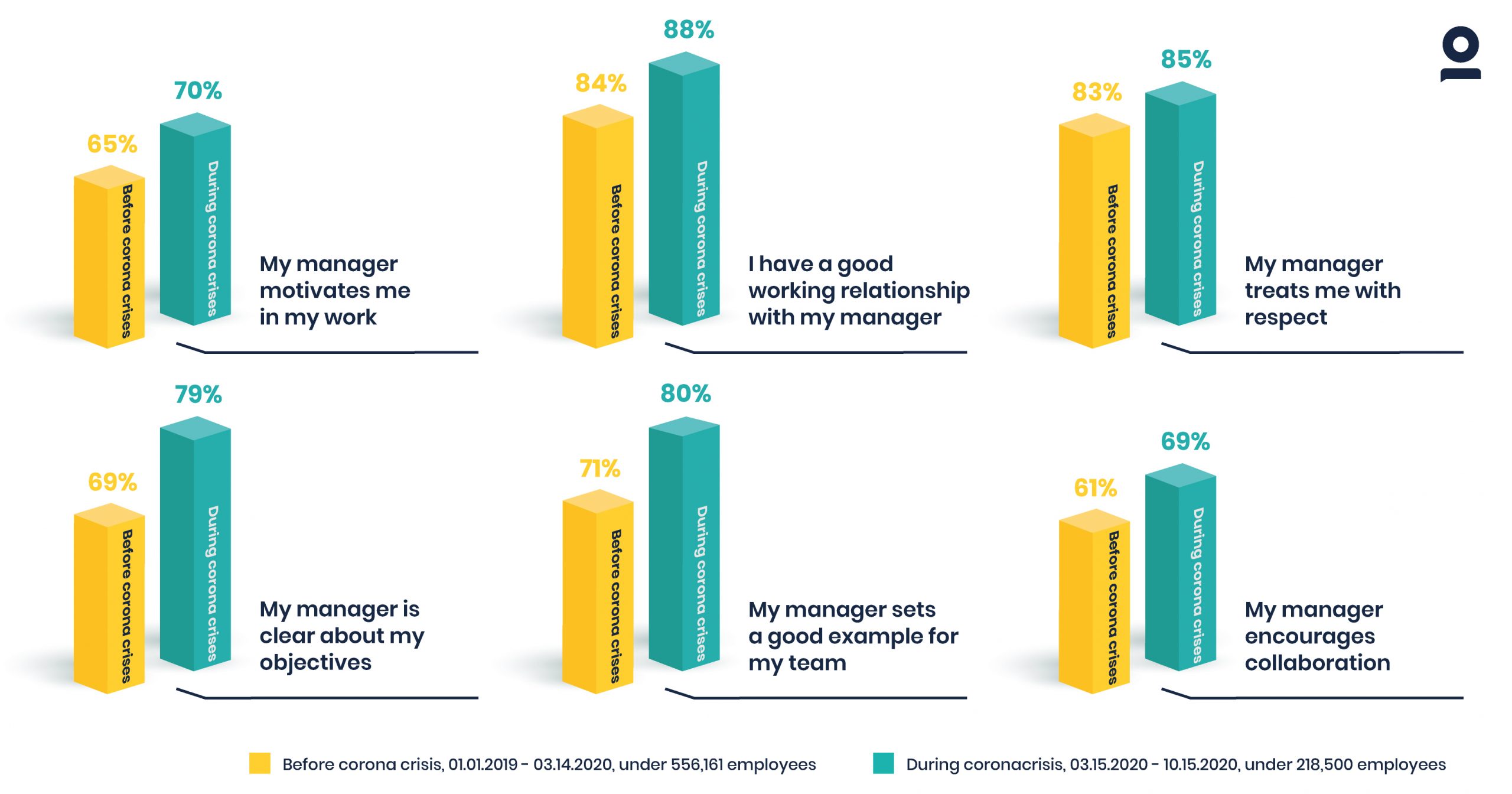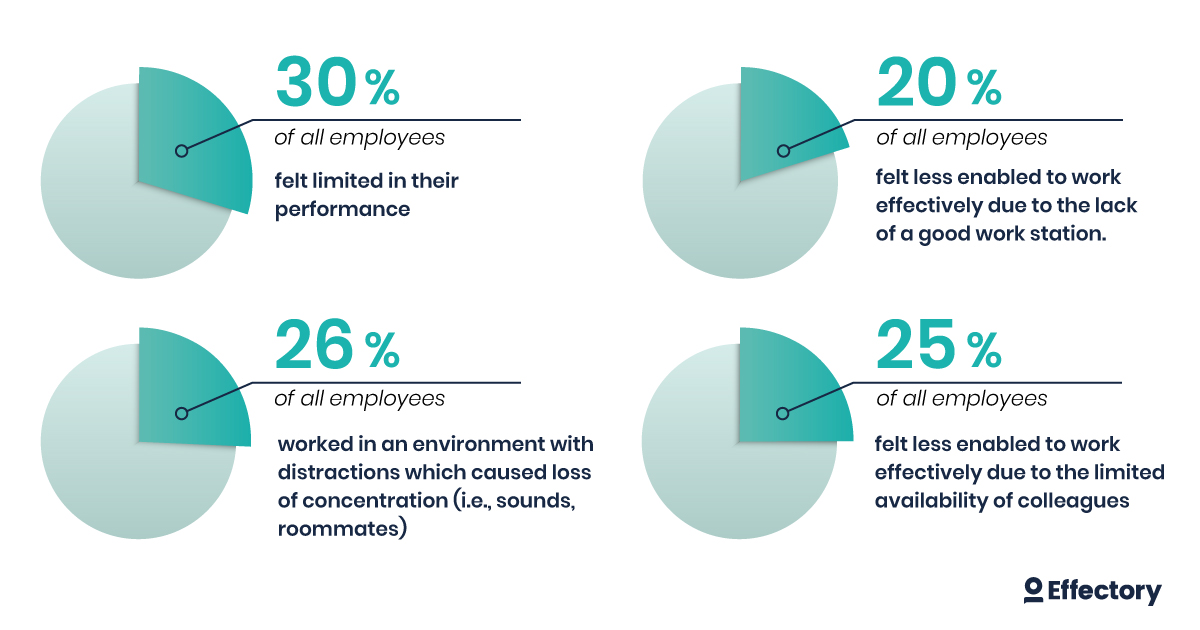What is the job of a manager during the coronavirus crisis? Creating an atmosphere in which employees feel welcome and appreciated despite all the distance and uncertainty.
Leadership is listening

Effectory pulse measurements between mid-March and mid-October 2020 reveal that managers in the Netherlands have been receiving higher scores from their employees since the coronavirus crisis began.
Yet managers feel more uncertain than ever before. What is their role, now that teams are largely working remotely? Their role is considerable, as evidenced by in-depth interviews conducted by American management researcher Wei Zheng among 187 employees during the first wave of the pandemic. Managers can help employees to feel more secure during difficult times; they can foster a feeling of connection despite the distance and ensure that employees feel that their contribution matters.
1. Show appreciation
Knowing that your efforts have been noticed and appreciated makes a huge difference. It is therefore no surprise that recognizing the commitment and contributions of employees was named by 44% of those interviewed as motivating leadership behavior.
This could be as simple as a thank you, or praise for a job well done. Or an email acknowledging your commitment. It’s even nicer if your manager credits you with the success of something during a team meeting. Or if you get the opportunity to work more closely with senior management. And if things are not going that well, perhaps because your home situation makes it difficult for you to focus, it can mean a lot if your manager gives you the opportunity during every Zoom meeting to summarize what you’re working on. These are all forms of affirmation; ways that you can show your employees that you value their presence and their work even while working remotely.
Whitepaper: Hybrid working is the new normal
How are you preparing your company for the changes ahead? Tuning into the needs of your workforce will be vital to compete effectively in the post-COVID world.
Download2. Provide individualized support
As a manager, it is important to demonstrate an understanding of the individual circumstances, needs and preferences that create the framework in which employees work. This point was mentioned by 21% of the people interviewed by Wei Zheng. Everyone is unique when it comes to family situation, living environment and feelings about working remotely. Employees appreciate it when their manager regularly checks how things are going and is aware of their specific challenges.
Not everyone will be able to guarantee 100% commitment under these circumstances. It can help enormously if, for example, a manager redistributes tasks based on what employees working remotely are realistically able to achieve. This can reduce stress, boost trust within the team and motivate employees to maximize their commitment.
Employee experience in 3 easy steps
Learn the best ways to improve the employee experience in your organization with these 3 easy-to-follow tips! Get your copy today!
Download: employee experience tips4. Entrust employees with new responsibilities
It may sound a little counterintuitive given that people’s mental bandwidth during a crisis is often somewhat reduced, but it can actually be really motivating for employees to be assigned new responsibilities in just this kind of scenario. Some 13% of people interviewed by Wei Zheng mentioned this point. This approach could involve taking on managerial duties while the managers themselves have their hands full handling the crisis situation. The employees receive a boost to their self-confidence and also have the opportunity to widen their circle of colleagues and acquaintances within the organization.
5. Designate time and space for team bonding
Even when forced to keep our distance, we are social animals at our core. Of those interviewed, 10% said they like it when their manager organizes informal meetings. This could be things like virtual coffee breaks, online lunches and Friday afternoon drinks via Zoom. Get-togethers like this can relieve stress and enhance the feeling that you are part of a team. After all, in an ideal scenario your job is not purely a means to an end. For employees, it is important to have a manager who organizes, facilitates or at least sanctions these kinds of meeting.
Form new habits
Until recently, organizations were primarily focused on attracting the right talent — a process made more difficult by unprecedented growth and significant labor shortages. We are living through a period of change; a time in which debt, the threat of mass redundancy and drastic cuts have become the norm.
Listening carefully to your employees’ experiences, preferences and ideas right now in particular will help you to keep going through the volatility of the coming months, affirm your organization’s reason for being and continue to strengthen your long-term position. This will mean that you can form new leadership habits that will continue to bear fruit long after this crisis has passed.
Engagement in your work
In a series of articles, Guido Heezen, a Director at Effectory, explains the conditions required to create an engaged workforce. Engagement is the extent to which employees revel in their work. Engaged employees learn quickly and are creative. Engagement is a good predictor for customer satisfaction, low employee turnover, high productivity and profitability.
Book a free demo. See our solutions in action.
Effectory is Europe's Leading provider of Employee Listening Solutions. Schedule a product demo and discover how to enhance your employees' engagement.
Demo request



